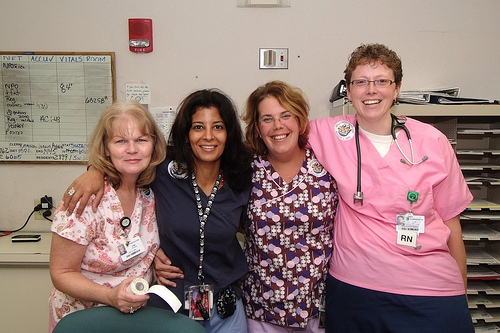November is National Family Caregivers Month. There are over 90 million caregivers in the United States today. Caregivers help provide for the emotional, physical and daily needs of parents, children, spouses and other family members. The needs of the infirm, disabled and elderly are well-known and publicized, but who cares for the caregivers? It is important to recognize caregivers because these individuals have a difficult task of balancing their roles as both a caregiver and as a family member. Caregivers give so much, but is important for them to provide quality care while also staying healthy and active themselves. By recognizing caregivers, we can help give them needed support, education and resources.
The transition from a family member living independently to moving into an assisted living home is often a difficult time brought about by a deterioration in mental or physical health or abilities. A family may make the decision to help a loved one move into an assisted living home when a loved one’s needs go beyond their family’s ability to care for them. Here are five ways to help you and your loved one cope when an assisted living home is the next step.
- Downsize – Helping your family member pare down their lifetime to a few boxes can be a difficult task. If there are other family members who may enjoy some of their excess possessions, encourage your elderly family member to go ahead and give some of their items away. Then your family member can enjoy seeing their items put to good use.
- Team up with other siblings and family members – Caregivers need a support network of their own! Do not try to be the sole provider for your family member, you may suffer burn out. Reach out to other family members and friends for help and support. Communicating with siblings is key during a difficult time like this. A team of siblings can provide an excellent level of care for their family member and for each other. Share in the responsibility and the expenses so that no individual has to go through caregiving alone.
- Be sensitive – If your loved one could choose to care for themselves, they probably would! Growing older and becoming less independent can be difficult. It can be an odd experience to begin caring for an adult who once cared for you. An elderly relative may have a hard time admitting they need some help.
- Get organized – A move to an assisted living home often coincides with the diminished mental or physical capabilities of your loved one. Help them make the transition as easy as possible by organizing their things. If they have trouble walking or reaching things high up, organize there new place so everything they use on a daily basis is readily accessible. A family photo album may help a loved one with memory loss recognize and remember other family members.
- Make new friends, but keep the old – Encourage your family member to become involved in their new community. There are senior activities and new friends to be made. An assisted living home offers something that living independently cannot, a built-in community of peers and others on the same stage in life as your loved one! Don’t forget to help your family member maintain old relationships with phone calls and visits.
Image Source: www.flickr.com/photos/christianacare/3856177781
Original Source: https://squarecowmovers.com/when-an-assisted-living-home-is-the-next-step

